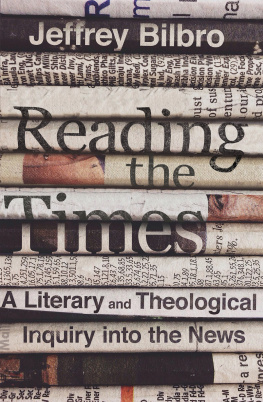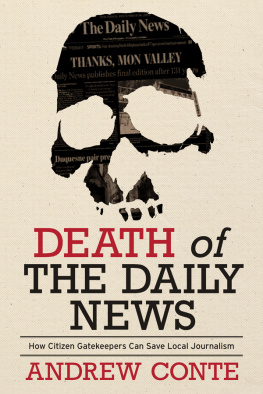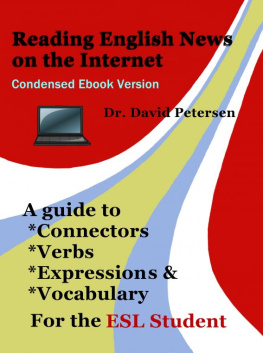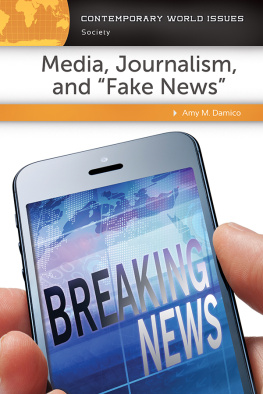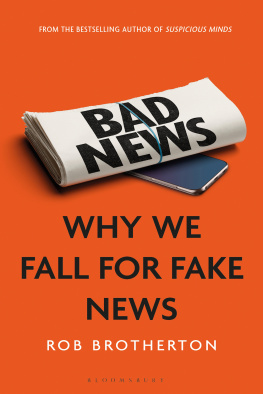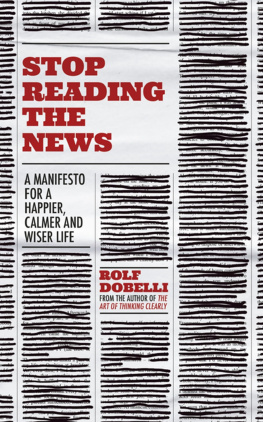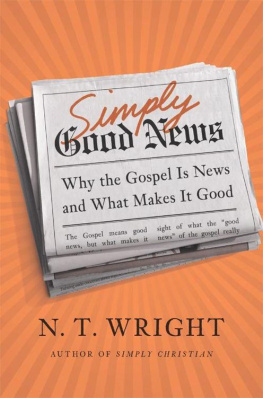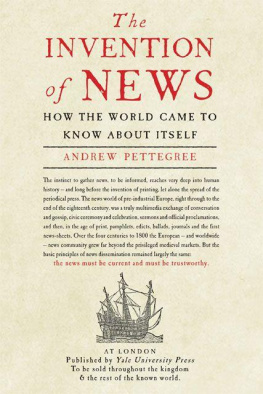Sommaire
Pagination de l'dition papier
Guide
InterVarsity Press
P.O. Box 1400, Downers Grove, IL 60515-1426
ivpress.com
email@ivpress.com
2021 by Jeffrey Lyle Bilbro
All rights reserved. No part of this book may be reproduced in any form without written permission from InterVarsity Press.
InterVarsity Press is the book-publishing division of InterVarsity Christian Fellowship/USA, a movement of students and faculty active on campus at hundreds of universities, colleges, and schools of nursing in the United States of America, and a member movement of the International Fellowship of Evangelical Students. For information about local and regional activities, visit intervarsity.org.
Scripture quotations, unless otherwise noted, are from The Holy Bible, English Standard Version, copyright 2001 by Crossway Bibles, a division of Good News Publishers. Used by permission. All rights reserved.
While any stories in this book are true, some names and identifying information may have been changed to protect the privacy of individuals.
. The First American Macadam Road, 1823, by Carl Rakeman, used courtesy of Federal Highway Administration, United States Department of Transportation.
. Solitude, 1933, by Marc Chagall, 2020 Artists Rights Society (ARS), New York / ADAGP, Paris, used by permission.
. Luke Anthology, Donald Jackson with contributions from Aidan Hart and Sally Mae Joseph, 2002, The Saint Johns Bible, Saint Johns University, Collegeville, Minnesota USA. Used by permission. All rights reserved.
, public domain.
The publisher cant verify the accuracy of website hyperlinks beyond the date of print publication.
Cover design and image composite: David Fassett
Image: David Crunelle / EyeEm / Getty Images
ISBN 978-0-8308-4186-8 (digital)
ISBN 978-0-8308-4185-1 (print)
This digital document has been produced by Nord Compo.
To Melissa and Hannah,
with whom I am grateful to be on pilgrimage.
Hannahs oft-repeated Look at me, Daddy! reminds me
to attend to what is most newsworthy in my life.
But to apprehend
The point of intersection of the timeless
With time, is an occupation for the saint
No occupation either, but something given
And taken, in a lifetimes death in love,
Ardour and selflessness and self-surrender.
....
These are only hints and guesses,
Hints followed by guesses; and the rest
Is prayer, observance, discipline, thought and action.
The hint half guessed, the gift half understood, is Incarnation.
T. S. ELIOT, DRY SALVAGES
Acknowledgments
ALTHOUGH IM RATHER CRITICAL of social media in this book, I should begin by confessing that this project was sparked by a Twitter conversation. Noah Toly and Martyn Wendell Jones exchanged tweets about the need for a book on how Christians should consume the news. That was the provocation I needed to begin organizing some long-standing thoughts and ideas I had on this topic. When I tweeted that I was drafting a book in response, Jon Boyd wrote me to express his interest in the project. So my thanks go to Noah and Martyn (and even, I suppose, to Twitter, or really to the wonderful people who find ways to use that tool redemptively); Im sure this isnt the book they had in mind, but I hope it proves to be helpful to some readers nonetheless.
Writing can be a lonely endeavor, but Im grateful for my family, friends, and colleagues who discussed some of these ideas with me, read drafts, and reminded me that belonging well precedes thinking well. My parents read and commented on a full draft, and many of my colleagues at Spring Arbor University asked me hard questions that made the final version better. Jons keen editorial eye and the comments from IVPs anonymous readers also guided my revisions. If stupid claims remain, I have only myself to blame. Im also grateful for the course release that Spring Arbor University granted me to complete this book and for the remarkable team of librarians at the White Library.
The Front Porch Republic community has been a source of great encouragement to me: Matt Stewart and Eric Miller in particular helped me hone some of my thinking on these matters. When I told Jason Peters I was working on a book about how we should read the news, he replied, That would be a short book if I wrote it: Ignore it. Despite his judgment of the subject, he has been much kinder to the author.
The dedication records my greatest debt.
Introduction
Reading the News in Order to Love Our Neighbors
IN EARLY 2017, less than a month after Donald Trump was inaugurated as the president of the United States, the Washington Post adopted a new slogan: Democracy Dies in Darkness. There is of course a long tradition that sees a free and independent press as essential to a healthy democracy and the common good. In our postfact culture, moreover, paeans to the importance of the press have grown increasingly emphatic. And for good reason: the media can host a thoughtful, informed conversation around the issues of our day, and such a conversation does indeed serve the common good. Yet, when we are inundated with stories and issues that demand our attention, it seems rather naive to think that democracy will be preserved if we simply have more news, more fact checking, more investigative reporting, and more deep dives. We dont just need the media to cast a more piercing light; rather, as consumers of the news, we need to reevaluate the light we rely on to understand our times and discern how to respond.
In the prologue to his Gospel, John directs our attention to a different light: the Word who is the light [that] shines in the darkness. And John reassures us that the darkness has not overcome it (Jn 1:5). John urges us to place our faith not in the light shed by the news of the moment but in the light of the good news that speaks time itself into existence. The primary light we need to participate in democracy, to serve the common good, and to dwell as faithful citizens of the City of God is shed not by the Washington Post but by the light of the world (Jn 8:12). How might we begin living by this light now, in the midst of a world where darkness often seems to prevail?
For centuries Christians, particularly in the Protestant tradition, saw printing technologies and the freedom of the press as handmaidens to the light of the gospel. Yet matters seem more fraught in our digital-media ecosystem. Ivan Illichs understanding of technological change may illuminate this historical trajectory. Illich claims that when industrial technologies replace traditional tools, there is an initial inflection point at which industrialization introduces significant improvements. However, at some later point, the industrialized tools begin causing new problems and the marginal utility of further professionalization and industrialization declines. After this second watershed is passed, the application of industrial technologies causes more harm than good. In the context of medicine, Illich locates the first watershed around 1913 as germ theory and new medicines led to marked improvement in peoples health. But by the 1950s, iatrogenic diseasesthose induced by the medical systemwere on the rise, and the cost of healing was dwarfed by the cost of extending sick life. Illich traces a similar trajectory in many spheres of life, including education, the mails, social work, transportation, and even civil engineering. If, in the context of media technologies, Gutenbergs press represents the first watershed, the second watershed may have been the application of steam power to printing. Digital media have recapitulated this cycle: if the first watershed of digital texts was crossed at some point in the early 1990s, the second one may be marked by the 2007 release of the iPhone. As smartphones became ubiquitous, a few companiesFacebook, Google, and Amazon in particularconsolidated and monetized the more decentralized flow of information that marked the early days of the internet.

